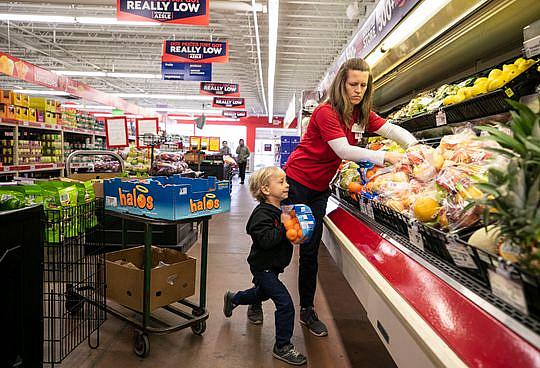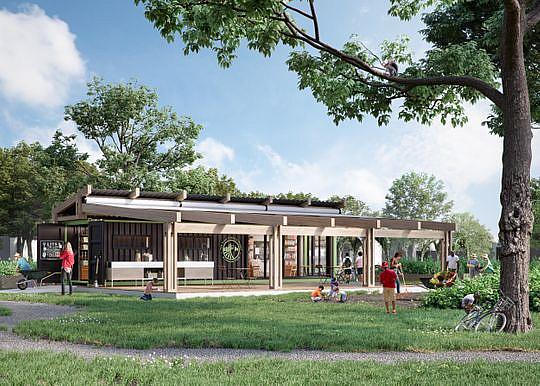How a low-income Louisville neighborhood became a fresh food oasis
The Courier Journal's continued coverage of food insecurity in Louisville is supported by the University of Southern California Center for Health Journalism's 2018 National Fellowship.
Other stories in this series include:
Tell us: How do you get food where you live in Louisville?
Dare to Care relocation may bring job training, grocery to the West End
Shelby Park's Save-A-Lot closed with little warning to neighbors
Sorry, we're closed: How everyone is hurt when grocery stores shut down
In 30 seconds: What you should know about food deserts in Louisville
Tuition or food? How college kids use food pantries to help food insecurity
Louisville has a fresh food problem. Can we fix it?
'A real crisis in Louisville': Readers respond to food desert series
How a low-income Louisville neighborhood became a fresh food oasis
How can cities end food deserts? Here are 4 solutions that worked
Louisville families shouldn't be struggling to find fresh food
No grocery store in your neighborhood? Join forces to create one
People can't get to a grocery store easily. So these volunteers are driving them
Would you shop at a mobile grocery store? Kroger is betting on it
Where You Live Determines How Much Your Eggs Cost at Kroger
How some residents get their food in Louisville's food deserts
Louisville's vacant grocery stores find new tenants. But they won't sell food
How these Louisville companies are helping employees buy affordable fresh produce
Can indoor farming fix food deserts? These Louisville students think so
Kentucky's hunger initiative earns national attention. But thousands still need food
Downtown Louisville is growing rapidly. So why doesn't it have a grocery store?
Is crime driving grocery stores out of Louisville's low-income communities?
Louisville kids are still at risk for lead poisoning. Here's how healthy eating can help
When will downtown Louisville get a grocery store? Here's what we found
Everything you need to know about Kroger's mobile grocery store in Louisville
Kroger's mobile market brings fresh food to Louisville neighborhoods without access
This nonprofit leader is giving west Louisville the black-owned grocery it 'deserves'

Jenny Kute and four-year-old son Henry put out fresh produce at the family's Save-A-Lot on Taylor Boulevard in the Hazelwood neighborhood of Louisville. Kute and husband Craig Oeswein had tailored the store to offer international foods for its customers as well as farm-to-store produce in the summer months. There is a farm behind the store's back lot that grows vegetables and the owners sell it at the store.
(Photo Credit: Matt Stone/Courier Journal)
In Louisville's Hazelwood neighborhood, where a third of the residents live in poverty, an urban farm has grown from the site of a former low-income housing complex.
It took two years for community members to remove truckloads of concrete from the 14 acres where the farm now resides. But come spring, the farm will produce crops that the nonprofit Food Literacy Project can use to teach youth leadership skills and engage with residents who want to reconnect with the land.
The farm has become central to a communitywide movement to improve food access within the Hazelwood and Iroquois neighborhoods, located in southern Jefferson County.
Sorry, we're closed: How everyone is hurt when grocery stores shut down
As grocery stores close countywide, leaving thousands of people without adequate access to healthy food, the farm and several neighboring entities have formed something of their own food hub, with each partner playing its own role.
At a Save-A-Lot grocery store, owners Jenny Kute and Craig Oeswein sell produce grown by the Food Literacy Project's employees and volunteers. And they allow the nonprofit to set up a farmers market outside the store's doors in the growing months.
At Hazelwood Elementary, the Food Literacy Project teaches students how to cook healthy meals through its Field-to-Fork club. And at the Iroquois Family Health Center, pediatrician Julia Richerson screens families for signs of food insecurity, providing them with a small box of food if they seem to be in need.
The goal of the agencies' combined effort is to promote healthy eating as a way to reduce diet-related illnesses and give choices back to residents who have lost them.
"We see this as a cohesive effort with programming in schools, programming in community centers, direct relationships with neighbors to food access and food production," said Angelique Perez, assistant executive director for the Food Literacy Project.
"We've always been of the belief that while this community faces real challenges, there's also a lot of assets here, and these people are uniquely positioned to lead a food security effort, a neighborhood change effort."
Rendering of a pavilion that the Food Literacy Project expects to open at its Iroquois Farm in spring 2019. (Photo Credit: Food Literacy Project)
In October, the Food Literacy Project broke ground on a shipping container pavilion and outdoor kitchen where the nonprofit will be able to provide new programming. The pavilion should open this spring, Perez said.
Learn more about the project and the nonprofit at foodliteracyproject.org.
[This story was originally published by Courier Journal.]

